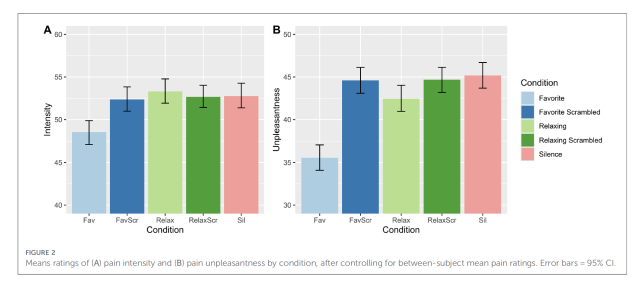Chronic Pain
Can Music Reduce Pain?
New research shows that listening to your favorite tunes can reduce acute pain.
Posted October 29, 2023 Reviewed by Jessica Schrader
Key points
- Music has been shown to ease pain, but the mechanisms are still unclear.
- A new study shows that your favorite songs, but not generic relaxing music, can reduce acute thermal pain.
- People who experienced more musical chills from the songs were more likely to experience pain relief.
Music is often described as the medicine of the soul. Research has corroborated this idea and has actually shown that music can help people deal with pain. For example, a study showed that music is an effective supplement to opioid-based treatments for chronic pain (Chai et al., 2017).
However, the mechanisms of why music helps relieve pain are not clear. Nor is it clear whether certain types of music are more effective than others. Previous studies have shown that the type of music that is most effective for pain is depends on the listener and has to do more with their personal preferences and history than with any specific characteristic of the music. It has been suggested that a person’s favorite music may trigger emotionally rich memories that, in turn, can work to combat unpleasant feelings and emotions, including physical pain.
A new study published in this month’s issue of Frontiers in Pain Research investigated whether there are specific emotional themes in the music that people find effective for pain relief. In the study by Darius Valevicius and colleagues at McGill University, participants listened to relaxing (but unfamiliar) music as well as segments of their self-selected favorite songs. None of the participants had chronic pain nor regularly used analgesics. To induce acute pain in the lab, the researchers used a thermal contact probe to stimulate different spots on participants’' forearms, applying a temperature of about 120 degrees Fahrenheit for up to 10 seconds Participants reported their pain on both a pain intensity scale and a pain unpleasantness scale, while listening to their favorite songs, unfamiliar relaxing music, scrambled versions of these (which involved cutting the track into 500 ms segments and shuffling them randomly), or in silence.
Not all music is equally effective at reducing pain
The results showed that only participants' favorite music had a noticeable effect in reducing pain intensity and unpleasantness compared to a silent condition. Neither unfamiliar relaxing music, nor scrambled versions of their favorite music, had this effect. The figure below shows these results on both the pain intensity (left) and unpleasantness (right) scales, which range from 0% to 100%. Lower bars indicate less pain.

In addition, participants rated music segments on different qualities, including whether they produced musical chills (also known as Frisson). The researchers found that experiencing chills was associated with a stronger analgesic effect, suggesting chills may be part of the mechanism. Furthermore, a thematic analysis of follow-up interviews with participants revealed four common categories of emotional themes that participants motioned associated with the analgesic effects of music: moving, calming, active, and happy.
These findings are promising, but many questions remain open. For example, the study shows how listening to your favorite music may help ease pain associated with feeling a hot object on your skin. Will these results extend to other types of pain, or to other contexts outside the controlled lab setting? More research will be needed to pinpoint the neural mechanisms of music's analgesic effects and how they might manifest across different contexts.
References
Chai, P. R., Carreiro, S., Ranney, M. L., Karanam, K., Ahtisaari, M., Edwards, R., ... & Boyer, E. W. (2017). Music as an adjunct to opioid-based analgesia. Journal of Medical Toxicology, 13, 249-254
Valevicius, D. J., Lopez, A. L., Diushekeeva, A., Lee, A., & Roy, M. Emotional responses to favorite and relaxing music predict music-induced hypoalgesia. Frontiers in Pain Research, 4, 1210572.


